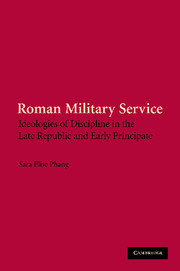Book contents
- Frontmatter
- Contents
- Preface and Acknowledgments
- Abbreviations
- General Introduction
- 1 Theorizing Disciplina: Social Conflict, Legitimation, and Power
- 2 Combat Training and Discipline
- 3 Viri Militares: Habitus and Discipline
- 4 Disciplina and Punishment
- 5 Disciplining Wealth: The Ideologies of Stipendia and Donativa
- 6 Labor Militaris: Work as Discipline
- 7 Feasts of Mass Destruction: Disciplina and Austerity
- General Conclusion
- Bibliography
- Index
- Frontmatter
- Contents
- Preface and Acknowledgments
- Abbreviations
- General Introduction
- 1 Theorizing Disciplina: Social Conflict, Legitimation, and Power
- 2 Combat Training and Discipline
- 3 Viri Militares: Habitus and Discipline
- 4 Disciplina and Punishment
- 5 Disciplining Wealth: The Ideologies of Stipendia and Donativa
- 6 Labor Militaris: Work as Discipline
- 7 Feasts of Mass Destruction: Disciplina and Austerity
- General Conclusion
- Bibliography
- Index
Summary
THE RATIONALITY OF DISCIPLINE
In the early Empire, disciplina militaris attempted to routinize the army as a source of imperial power, mitigating conflict between emperors, aristocracy, and soldiers and discouraging usurpations by promoting both protobureaucratic rationalization and values or behaviors that produced the habitus appropriate to soldiers and officers. Ironically, discipline's dissociation of service from “sordid” economic matters also resembles Weber's concept of charismatic authority. Unlike an industry or a civilian bureaucracy, a military institution cannot be fully rationalized. Military service must motivate its personnel to undergo extraordinary risks and effort; it requires their social cohesion; and it demands special leadership qualities of its officers. Value-rational policies (a code of honor, etc.) are often promoted. In the Roman army, instead of a formal code, exemplary narratives, anecdotes, and treatises promoted specific habitus.
In the Roman army, full rationalization was impeded by tradition and by the charismatic authority projected by the commanders. Imperium militiae and its descendant in the Empire gave commanders unfetted authority over soldiers. Commanders could punish with inventive severity, as when Galba starved a soldier to death to punish him for extortion, or conversely to mitigate punishment, as Marius did with Trebonius or Septimius Severus with the Praetorians.
Disciplina militaris's rationalization countered patrimonial elements of authority in the Roman army, which was a cross section of Roman society, from the emperor and senatorial legates at the top to common soldiers and soldiers' servants (the despised calones and lixae) at the bottom.
- Type
- Chapter
- Information
- Roman Military ServiceIdeologies of Discipline in the Late Republic and Early Principate, pp. 285 - 290Publisher: Cambridge University PressPrint publication year: 2008



